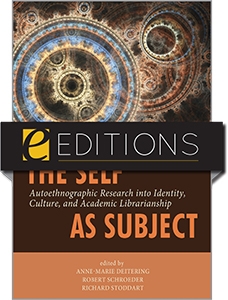
The Self as Subject: Autoethnographic Research into Identity, Culture, and Academic Librarianship—eEditions PDF e-book
The download link for this product can be found on the final confirmation screen after you complete your purchase, and may also be accessed from your Account Profile. For more information about ALA eEditions file types and how to view them on eReaders, desktop computers, and other devices, see this page.
Primary tabs
You don't need to be an ALA Member to purchase from the ALA Store, but you'll be asked to create an online account/profile during checkout to proceed. This Web Account is for both Members and non-Members. Note that your ALA Member discount will be applied at the final step of the checkout process.
If you are Tax-Exempt, please verify that your account is currently set up as exempt before placing your order, as our new fulfillment center will need current documentation. Learn how to verify here.
- Description
- Table of Contents
- About the authors
“[T]his collection is something rare and important for the discipline of librarianship.”
—from the Foreword by Barbara Fister
Autoethnography is a type of research that uses writing and self-examination to explore far-ranging cultural, political, and social issues through personal experience. It is a qualitative, reflexive, ethnographic method where the researcher is also the subject of inquiry.
Using autoethnography as their research method, the 21 academic librarian authors of The Self as Subject: Autoethnographic Research into Identity, Culture, and Academic Librarianship investigate aspects of what it means to be a librarian. Starting with a reflective examination of themselves, they each investigate questions of culture, values, and identity. The Self as Subject presents a collection of reflective narratives that, taken together, explore the varied dimensions of librarianship in the present moment. It also examines autoethnography’s potential to help librarians answer questions that cannot be answered by traditional, empirical research methods and to reveal voices that are obscured by aggregations of data.
All of the pieces in this volume share some characteristics: Each one is the result of a rigorous examination of the self and lived experience, and each one moves between the subjective and the cultural in its analysis. How the authors do this, however, varies widely—from a graphic novel to speculative fiction to rigorous academic analysis.
The Self as Subject provides an opportunity to expand our understanding of rigor and the practice of research in LIS, and explores what it means to be a librarian in this age of disruptive change, and how the various identities and experiences we bring to our practice shape our experience of librarianship. The Self as Subject is for any librarian interested in research and research methods; the use of literary genres in research; alternatives to large empirical studies; questions of identity and social justice; and those looking to step out of their comfort zone and approach learning from a new and challenging vantage point.
FOREWORD
Barbara Fister
ACKNOWLEDGMENTS
Anne-Marie Deitering, Robert Schroeder, and Rick Stoddart
INTRODUCTION. Why Autoethnography?
Anne-Marie Deitering
CHAPTER 1. Admitting What I Don’t Know: An Autoethnographic Study of Teaching, Fear, and Uncertainty
Anna Esty
CHAPTER 2. Avoiding Autoethnography: Writing toward Burnout
Benjamin R. Harris
CHAPTER 3. Version Control
Sarah Hartman-Caverly
CHAPTER 4. Finding Boomer Harding: An Autoethnography about History, Librarianship, and
Reconnecting
Heidi LM Jacobs
CHAPTER 5. When Worlds Collide
Derrick Jefferson
CHAPTER 6. Looking through a Colored Lens: A Black Librarian’s Narrative
La Loria Konata
CHAPTER 7. Cataloger’s Judgment and Cataloger’s Bias: On Lived Experience and Metadata Creation
Erin Leach
CHAPTER 8. Carving Out a Space: Ambiguity and Librarian Teacher Identity in the Academy
Janna Mattson, Maoria J. Kirker, Mary K. Oberlies, and Jason Byrd
CHAPTER 9. Away from the Library
David H. Michels
CHAPTER 10. Academic Rejection and Libraries
Emily Rogers
CHAPTER 11. You, She, I
An Autoethnographic Exploration through Noise
Michele R. Santamaría
CHAPTER 12. Many Hats, One Head: Considering Professional Identity in Academic Library Directorship
Maura A. Smale
CHAPTER 13. The Intersections of Art and Librarianship: “Filling in the Gaps”
Jolanda-Pieta (Joey) van Arnhem
CHAPTER 14. Librarian Origin Story
Mita Williams
CHAPTER 15. Evaluative Criteria for Autoethnographic Research: Who’s to Judge?
Robert Schroeder
CHAPTER 16. Shuffle the Cards, Save the Cat, and Eat the Cake
Rick Stoddart
Anne-Marie Deitering
Anne-Marie Deitering is the Associate University Librarian for Learning Services at Oregon State University Libraries and Press, where she oversees the libraries’ Teaching and Engagement, Library Experience and Access, and Assessment departments and also oversees the Guin Library at the Hatfield Marine Science Center. She blogs at https://info-fetishist.org and tweets as @amlibrarian.
Robert Schroeder
Robert Schroeder is Professor Emeritus at Portland State University, where he was a faculty member/librarian and AAUP union member. He was the liaison to the School of Education, the Urban Honors College, the University Studies (general education classes) in local high schools, and the McNair Scholar and Summer Bridge programs. His recent research interests include critical librarianship, Indigenous and autoethnographic research methods, and the ways (his) social class and (his) identity interact with (his experience of) the academy. Schroeder is coeditor of ACRL's The Self as Subject: Autoethnographic Research into Identity, Culture, and Academic Librarianship (2017).
Richard Stoddart
Rick Stoddart is an academic librarian at the University of Idaho.


